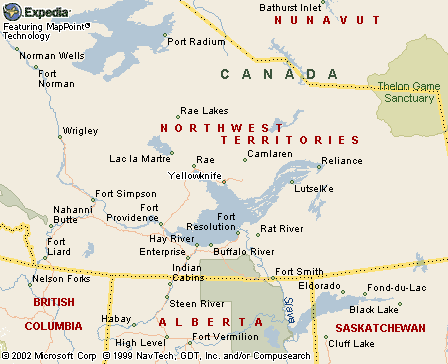|
|
Canku Ota |
|
|
(Many Paths) |
||
|
An Online Newsletter Celebrating Native America |
||
|
August 14, 2004 - Issue 119 |
||
|
|
||
|
River Outings Provide Needed Release for Teens |
||
|
by Matt Ross Indian Country Today |
||
|
credits: Rafting along the Tukon River, participants during the weekly water sessions enjoyed canoeing, kayaking and safety programs under the guidance of the Royal Canadian Mounted Police. (Photo by Matt Ross) |
|
The answer provided was practical. "You might want to sit on that side of the raft so if we flip you can get out," the helmsman urged, paddle in her hand. Nervously, I paid heed to her suggestion, clutching my camera bag with a death-like vice grip. "Nah, I’m just teasing. I always do that with first timers," she remarked brazenly. Comedy aside, the guide was all business when directing the raft down the Yukon River during the evening’s ride. Her commands were sharp to the rest of the crew and the desired direction was the result. Four water sessions earlier and it was Nicole who was the first-timer. With a voice of authority and confidence, she explained how a raft is steered. "Whichever way the current is going, you try to stick to that and you’re fine," the 14-year-old said. The teenager has been a regular during the weekly canoe, kayak and rafting sessions offered by the Royal Canadian Mounted Police (RCMP) for at-risk First Nations youth. One of the officers, Constable Eyvi Smith, coordinates these informal classes and has viewed the rapid progress of his participants. "It’s nothing for these kids to learn because they’ve always had to adapt to survive," Smith said. "To see these guys out here doing this is amazing." Now in its fourth year, this boating program frequently attracts up to a dozen kids. As Smith volunteers his time, the police fund the activity by providing the equipment, van and gasoline and when there are out of town trips involved, food money for the kids. There are about a half-dozen officers who participate on the water and another 10 who assist during the winter snowboarding sessions. Smith said any policing outfit could initiate a community program if there’s already an existing interest in an activity. "You have to have members who have the passion. I’m happy to be on the river and it gives me an excuse to be out here," the Constable said. There have been some barriers broken down between the RCMP and the teenagers. Even with these programs, there are some youth who still can’t shake the urge to break the law. Yet, when the cops encounter the kids, the scene is calm as everyone is on a first-name basis. Before entering the RCMP, Smith was a youth worker for four years in a group home so he’s seen several angles of the problems with troubled teens. Should kids be arrested, he suggests probation should involve mandatory participation in a supervised environment. "Part of the conditions should be to take part in a sport because if you can help a kid find their passion, alcohol and drugs all become second place," he stated. These meetings permit Smith to offer friendly advice about how there’s still time to turn their lives around. He’s noticed when they’re on the water, there’s an atmosphere of relaxation and instead of maintaining a gangster-like toughness needed to survive on the streets. They can finally have some fun without any social pressures. Dan, 15, has been canoeing and snowboarding with the cops for two years while admitting he’s still "on their list." Sarcastically he joked the reason these programs are there is "So they can tell their sergeant they’re doing something good." He conceded that these activities were for his benefit and advised some of his peers to attend. Smith however saw the changes in Dan and believes he has the fundamentals to apply those skills already learned towards becoming a river guide. There have already been other examples of teenagers who were struggling and are now leaders in tourism. |
|
|
www.expedia.com |
|
|
||
|
|
||
| Canku Ota is a free Newsletter celebrating Native America, its traditions and accomplishments . We do not provide subscriber or visitor names to anyone. Some articles presented in Canku Ota may contain copyright material. We have received appropriate permissions for republishing any articles. Material appearing here is distributed without profit or monetary gain to those who have expressed an interest. This is in accordance with Title 17 U.S.C. Section 107. | ||
|
Canku Ota is a copyright © 2000, 2001, 2002, 2003, 2004 of Vicki Barry and Paul Barry. |
||
 |
 |
|
|
The "Canku Ota - A Newsletter Celebrating Native America" web site and its design is the |
||
|
Copyright © 1999, 2000, 2001, 2002, 2003, 2004 of Paul C. Barry. |
||
|
All Rights Reserved. |
||
 WHITEHORSE,
Yukon - Inching my way into the floating craft, careful not to
misstep, I inquired where the driest area was to shoot photographs
and view the ride.
WHITEHORSE,
Yukon - Inching my way into the floating craft, careful not to
misstep, I inquired where the driest area was to shoot photographs
and view the ride. 